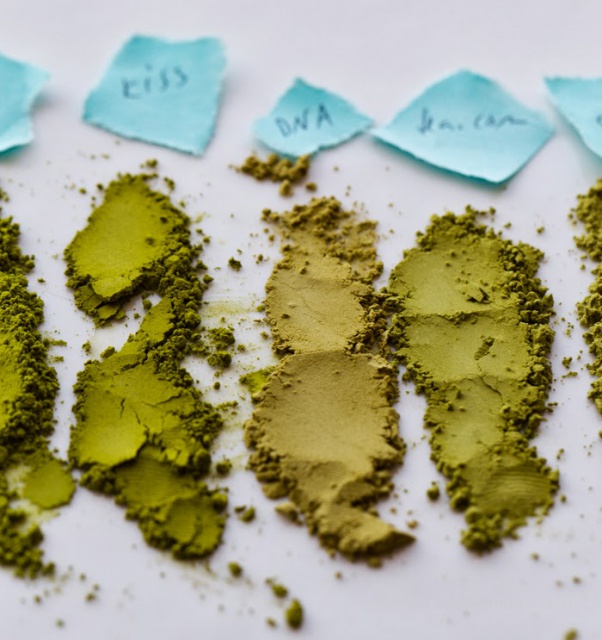Articles
Every powdered tea is automatically matcha, isn't it?
IT IS NOT! Unfortunately, it is not that easy.
There is one single rule: Japanese matcha tea is always green tea milled to a fine powder, BUT not every milled green tea is the real Japanese matcha.
Today, we call matcha for example a drink made of milled blue flowers, yellow lattes from turmeric or black lattes from burned coconuts.

But matcha is only one!
Maybe it seems a little confusing but there are a few distinct differences that will help you recognize the one and the real Japanese green tea matcha. The tea that is truly unique.
1) Specific way of growing
– 4 weeks before harvest are the tea plantations shaded and are left shaded until the harvest
2) Japanese exclusivity
– matcha’s name comes from Japanese
3) Tencha
– the initial product (the processed tea leaves without stems, only the pulp itself, that is only the pieces of carefully selected leaves), which is used for matcha production
4) Traditional milling in stone mills
– more than 800 years old traditional technology maintaining the best qualities of matcha
5) Sensoric properties
– emerald or vibrant green colour, characteristic grass scent and taste, the darker the higher quality
6) Absolutely clear tea powder
– with no added substances
7) Unique effects
– because of the limited amount of sunshine, the amount of chlorophyll is extra high (it helps as an antioxidant), besides that, matcha contains high amount of unique beneficial substances (for example up to 137times highest amount of EGCG than regular green tea, further polyphenols, higher amount of antioxidants, higher amount of L-theanine etc.)
8) Higher price
– as a premium product, matcha has its price that is proportional to its valuableness and difficult production


Powdered tea
1) Regular production
– grown as any other (green) tea, i.e. in full sunshine until harvest
2) Does not have to come from Japan
– comes from any other country or does not have country of origin guaranteed
3) Sencha
– the initial product (processed tea leaves usually with twigs and stems, entire leaves), which is in China often milled as an imitation of matcha
4) Milling of entire leaves
– includes „cheating“ in the traditional technology and does not guarantee the best qualities of the final product, they mill the entire tea leaf, not only its pulp
5) Sensoric qualities
– powder in the dark shades of yellow (or brown) with lumps, sometimes very dark green, bitter or tart taste, sometimes with big chunks
6) Possibly contains other substances
– because it is not the real matcha, this milled powder can contain other substances (for example sugar, copper to add to its colour, and other)
7) Regular effects
– as in all regular green (antioxidants, catechins etc.)
8) Lower price, sometimes significantly
– the usual „bait“ of the powdered tea sellers is its low price which in this case does not correspond with the price/quality ratio

From the facts above is crystal clear that the so called „matcha“ with China as country of origin should be called powdered tea. If is this type of tea called „matcha“, it is an incorrect name and it is misleading of the customer, most frequently to take advantage of the current popularity of the original Japanese matcha.
Does your matcha have current valid certifications?
When shopping for matcha, pay your full attention to the country of origin, the processing technology, and especially the certificates of your chosen matcha. Especially the current certificates regarding pesticides. We mean current as up to date because some sellers do not shy away from showing you certificates from 2013, which are not relevant. Give priority to the sensoric test, do not try to save money at any cost, and buy at certified suppliers who will provide you with all information, certificates, confirmations and more.
Matcha is a product that is unique. Although we offer it in its modern form, we have great respect to matcha. I personally went to Japan in 2013 to introduce the idea of modern preparation (shakers, sirups, etc.) Reaction of everyone I showed it was so positive that I decided to jump heads-in and try this idea in the Czech Republic. I am very happy with the current reaction of you, our customers, and we thank you for the trust you showed us even in difficult times. I guarantee that we will keep quality and all the legal standards up to 100% and you will always be able to count on matcha that is provided by a certified seller, that is grown only organically. Buying cheap imitations in order to raise our profit or deception of our customer is not our style. I am personally convinced that if we do the business fair, our customers will appreciate it sooner or later.
For the entire Matcha Team
Petr Patočka
executive director

